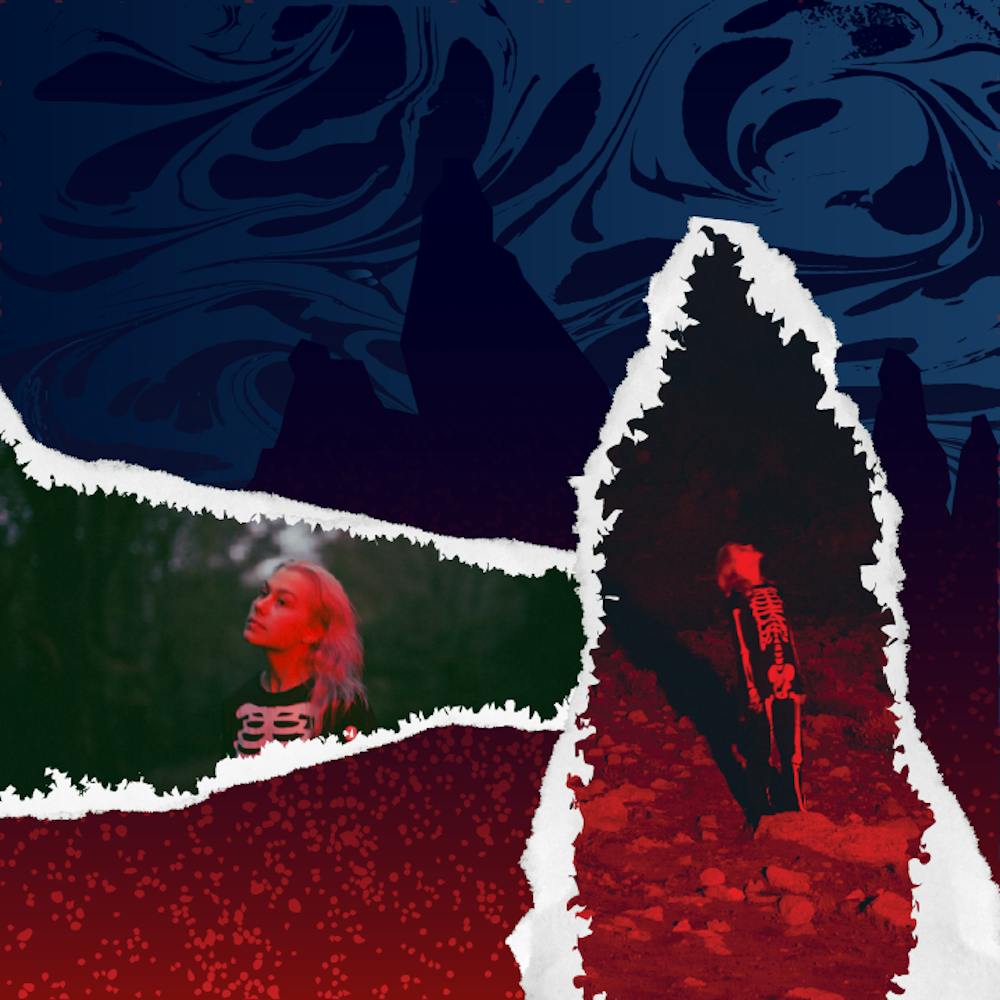Being an almost–twenty–something back in my childhood home during quarantine, I feel that I’ve been given dreadfully limitless hours to think about my life. I've been grappling with changing relationships, growing into adulthood while staring into an incalculable future, reminiscing on times I’ve fallen in love and fallen out of it, and the list goes on.
For 25–year–old Phoebe Bridgers, narrating unresolved feelings such as these has been the defining track of her music, and her life. Bridgers’ sophomore album, Punisher, dances through the trials and tribulations of early adult years, weaving uncertainty and dread into melodic choruses.
Punisher opens with “DVD Menu,” a one minute and nine second interlude that could be the background to a scene in Stranger Things. Eeriness is a trademark of Bridgers’ style, evident in the opening track’s unsettling combination of minor chords, unintelligible chatter, and gushing wind.
“DVD Menu” is followed by “Garden Song,” arguably the album’s strongest track. Compared to the spooky nature of "DVD Menu," "Garden Song" is comforting and jubilant, with Bridgers’ soft voice carrying over a mellow, folksy tune.
She sings, “Someday, I'm gonna live / In your house up on the hill / And when your skinhead neighbor goes missing / I'll plant a garden in the yard then.” Bridgers has never shied away from talking about death in her music, singing about Jeffrey Dahmer and the funeral of a boy her own age in her debut album Stranger in the Alps. This most recent reference to murdering a skinhead is no different.
But “Garden Song,” like many of Bridgers’ other songs, is not totally dark. The music itself is upbeat and includes lyrical references to California landmarks from Bridgers’ childhood and her first experiences with relationships. The track highlights one of her greatest talents: her intrinsic ability to weave together looming themes of anxiety and despair with lighthearted and ubiquitous scenes of life and love.
“Garden Song” is followed by “Kyoto,” a pop–style track complete with a full horn section.
In an interview with Apple Music, Bridgers says, “This song is about being on tour and hating tour, and then being home and hating home. I just always want to be where I’m not, which I think is pretty not special of a thought, but it is true.”
In “Kyoto” she sings, “Dreaming through Tokyo skies / I wanted to see the world / Then I flew over the ocean / And I changed my mind.” The theme of constant unease about her current state follows throughout the song, as she sings about the monotony of her suburban upbringing and her complicated relationship with her father. Bridgers has the uncanny ability to write about her own personal narrative in a poignantly universal way— telling the story of her own life while maintaining a certain relatable nostalgia.
Other standouts on the album include “Punisher” and “ICU.” Bridgers describes a “punisher” as the type of fan who will overstay their welcome when meeting an artist, so overwhelmed with awe that they become a drag. The song is largely about Bridgers’ obsession with the late Elliott Smith, an American singer–songwriter who rose to fame with his contributions to the soundtrack of Good Will Hunting.
In an interview with The New Yorker, she says, “if Elliott Smith were alive, I probably wouldn’t have been the most fun person for him to talk to...I’m a superfan, and I know way too much about his music. So I wrote that as if I were the punisher.”
Bridgers’ ode to Smith is breathtakingly beautiful, backed by quiet strings and piano in a waltz–like pattern. It’s the type of song that can only really be done justice when listened to in a quiet room. She sings, “What if I told you / I feel like I know you? / But we never met / It's for the best.”
“ICU” blends Bridgers’ pop and rock sensibilities as she sings about experiencing love and depression at the same time. The song includes a new instrumental intensity absent from her other music, as she sings, “I used to light you up / Now I can't even get you / To play the drums / 'Cause I don't know what I want / Until I fuck it up.”
Listening to “Punisher” from start to finish feels like watching a coming–of–age movie with a murder plot: dark and eerie, captivating, and wholeheartedly thoughtful. The more sinister elements of the album are balanced out by an honest account of adulthood growing pains, self–reflection, and the scary unknowns in life. Bridgers brings everyone into her world, while leaving space for introspection on the listener’s end as well. Punisher speaks to a beautiful truth while telling an unusual story, capturing what may be the greatest magic of Phoebe Bridgers.







